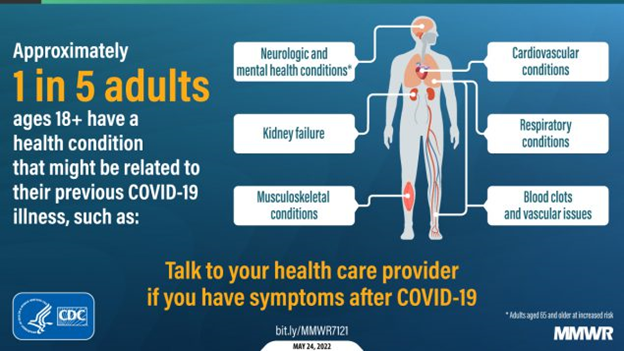According to a recent study from the CDC, 1 in 5 adults over the age of 18, who survived COVID-19 could develop long COVID-19.1 Here’s what it is and why students can college staff alike should be prepared for its long-term impacts.
What is long Covid?
Post-COVID conditions (PCC) or long COVID are the common terms associated with the long-term effects of the COVID-19 infection. Symptoms can range from fatigue, to neurological, respiratory, and heart symptoms. The CDC notes that these problems can arise in anyone who has been infected with COVID-19, including those who had very mild symptoms or were asymptomatic.2
According to the World Health Organization as many as 20 percent of the half-billion people worldwide estimated to be infected with coronavirus may experience mid- and long-term effects.3
Preparing for long COVID
Grappling with the COVID-19 pandemic has been difficult for college students, but now their attention needs to turn to long COVID. Throughout the pandemic, COVID-19 has led to a range of illnesses from severe, to mild and asymptomatic, that spanned weeks to a few months. Now mounting scientific evidence is showing that COVID-related illnesses can last much longer than an abbreviated span of time.1
At earlier points in the pandemic, it was thought that healthy, young people may not have to worry about lingering impacts of COVID-19, especially if they experienced a mild case. However, this is now proven untrue. Data shows that COVID-19 patients who were previously healthy and young, are being diagnosed with long COVID. In fact, one in five adults who had a confirmed case of COVID-19 have been reported to have long COVID symptoms. Let explore to understand long COVID and its impacts.1
What are the health conditions associated with long COVID?
The most common symptoms of long COVID are fatigue, cognitive dysfunction, and light headedness. Additionally, many people experience breathing issues, including shortness of breath, that can sometimes be permanent. This is often attributed to scaring that occurred during the most difficult periods of the symptoms.
According to the CDC, long COVID conditions can include a wide range of ongoing health problems, which can last as little as two weeks, to more than two years.2 Here are some of the other symptoms associated with long COVID impacting students.
Kidney problems
Regardless of whether one suffered a severe or mild case of COVID-19, they may show signs of kidney damage. Those who are at highest risk are patients with diabetes or high blood pressure, as well as those that experienced acute kidney injuries, from cytokine storms, pneumonia or blood clots. Patients who have had COVID-19-related kidney damage should follow up with their doctors to ensure kidney function is returning to normal.4
Heart problems
Heart problems are a possible complication of COVID 19. This may occur even in people who didn’t have myocarditis during acute COVID 19. If you have symptoms of chest pain, shortness of breath, lightheadedness, and palpitations after recovering from acute COVID 19, you need to see your physician.5
Loss of sense of smell and taste
A less severe, but still troubling effect of long COVID-19 is a loss or distorted sense of smell and taste. COVID-19 has the ability to affect the cells in your nose, which might make things taste strange and make things smell different than they usually would. While there are emerging treatments to restore these senses, it’s best to talk to your doctor about retraining and next best steps.6
Neurologic problems
Neurologic problems are also occurring in people with long COVID. This includes headaches, brain fog, difficulty concentrating, fatigue, and dizziness. It is not completely understood where these side effects come from, but that is an ongoing point of research. This can be a troubling issue for students, as their academic performance can greatly be impacted. Again, following up with your physician is recommended.1
The impacts of long COVID on college students
The symptoms of long COVID can be serious and have a substantial impact on young adults. One major reason for this, is that long COVID disproportionately affects people who are stressed, and oftentimes, college students are incredibly stressed.
To make sure that students are as healthy as they can be, it is important that schools are equipped to help students through long COVID. They can do this in a few simple ways:
- Identify who has long COVID and be proactive with communications
- If possible, colleges should try to get confirmation of students who are experiencing long COVID symptoms. To help with this, survey students to identify the kinds of symptoms that they’re having, so information on resources they need on- and off-campus can be made available.
- Have clear roadmaps available for students to seek care
- It can be difficult for students to understand how to navigate the right care based on their symptoms. After all, there continue to be new findings about COVID-19 almost daily. By providing students with steps to take and facilities to seek out based on symptoms, it can alleviate the impact on their health and academic performance.
- Train Faculty and Staff
- In July of 2021 the federal government designated long COVID as a disability under the Americans with Disabilities Act. So, if a student can provide documentation that their long COVID substantially limits one or more major life activities, they would have a disability under Section 504.8 Meaning schools may need to accommodate and make concessions or reasonable modifications to meet their needs.
- Due to their level of exposure to students, faculty and staff can act as front-line advocates for them. By proactively noting levels of engagement, performance and asking students how they are feeling, they can better serve their needs and quickly refer to the student health center or local physician to seek diagnosis.8
- Assist with access to mental health services
- Offering comprehensive care includes mental health. However, the ongoing needs of COVID have put a huge strain on mental health resources. Alternative therapies have proven to be as effective as face-to-face treatments. Encouraging use of online therapy can greatly increase access. Programs like Wellfleet’s Complete Behavioral Health Solution can provide access to local in-network facilities, a national network of virtual behavioral health care specialists and 24/7/365 phone support from licensed clinicians.
Although we are still learning about the effects of long COVID, schools and providers alike need to take action to help support students in need. Check out more COVID-19 resources Wellfleet Student offers.
References
1 Bull-Otterson, L, PhD., Baca, S., et al. (2022, May 24). Post–COVID Conditions Among Adult COVID-19 Survivors Aged 18–64 and ≥65 Years — United States, March 2020–November 2021. Retrieved on June 1, 2022, from https://www.cdc.gov/mmwr/volumes/71/wr/mm7121e1.htm.
2 Centers for Disease Control. (2022, May 5).Long COVID or Post-COVID Conditions. Retrieved on June 1, 2022, from https://www.cdc.gov/coronavirus/2019-ncov/long-term-effects/index.html.
3 Cha, A. E. (2022, May 25). Vaccines may not prevent many symptoms of long covid, study suggests. Retrieved on June 1, 2022, from https://www.washingtonpost.com/health/2022/05/25/long-covid-vaccines-slight-protection/.
4 Sperati, John, C. M.D, M.H.S. (2022, March 1). Coronavirus: Kidney Damage Caused by COVID-19. Retrieved on June 1, 2022, from https://www.hopkinsmedicine.org/health/conditions-and-diseases/coronavirus/coronavirus-kidney-damage-caused-by-covid19
5 Skolnik, N., Fidler, S.K., (May 20,2022). Management of Post-COVID Cardiac Symptoms. Retrieved on June 1, 2022, from https://www.Management of Post-COVID Cardiac Symptoms (medscape.com).
6 Gomes, M. (2022, March 9). Research project testing new treatment to restore COVID long-haulers’ sense of taste, smell. Retrieved on June 1, 2022, from https://www.cbsnews.com/newyork/news/long-covid-loss-of-taste-smell-treatment/.
7 Paul, E., Fancourt, D. (2022, April 06). Does pre-infection stress increase the risk of long COVID? Longitudinal associations between adversity worries and experiences in the month prior to COVID-19 infection and the development of long COVID and specific long COVID symptoms. Retrieved on June 1, 2022, from https://www.medrxiv.org/content/10.1101/2022.04.06.22273444v1.
8 United States department of education office for civil rights office of special education and rehabilitative services. (2021, July 26). Long COVID under Section 504 and the IDEA: A Resource to Support Children, Students, Educators, Schools, Service Providers, and Families. Retrieved on June 1, 2022, from https://sites.ed.gov/idea/files/ocr-factsheet-504-20210726.pdf.
9 Comegno, J. B II. (2021, October 11). 3 Things for Schools to Remember About Long COVID Diagnoses. Retrieved on June 1, 2022, from https://www.frontlineeducation.com/blog/long-haul-covid-considerations-for-k12-schools/.



